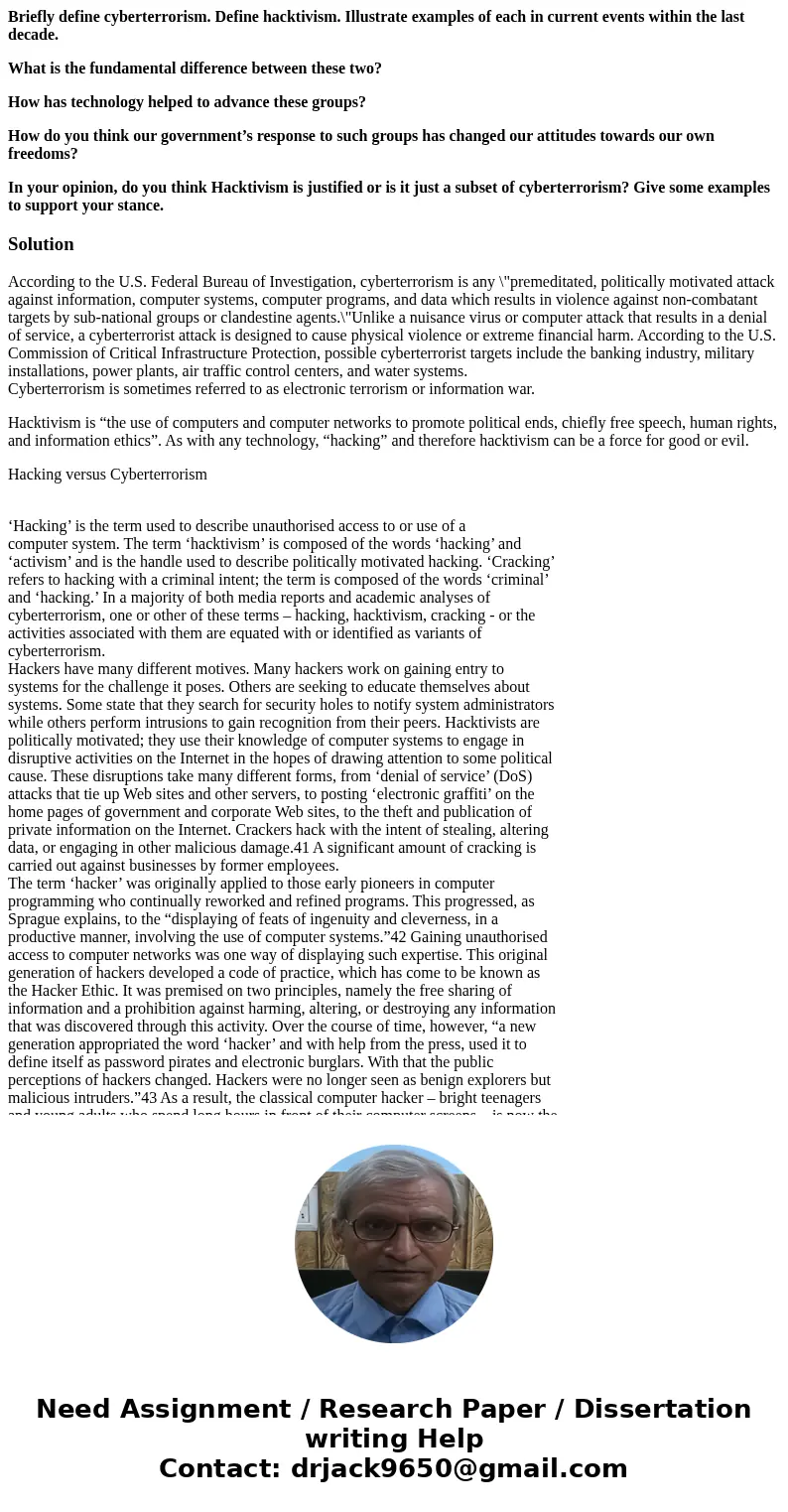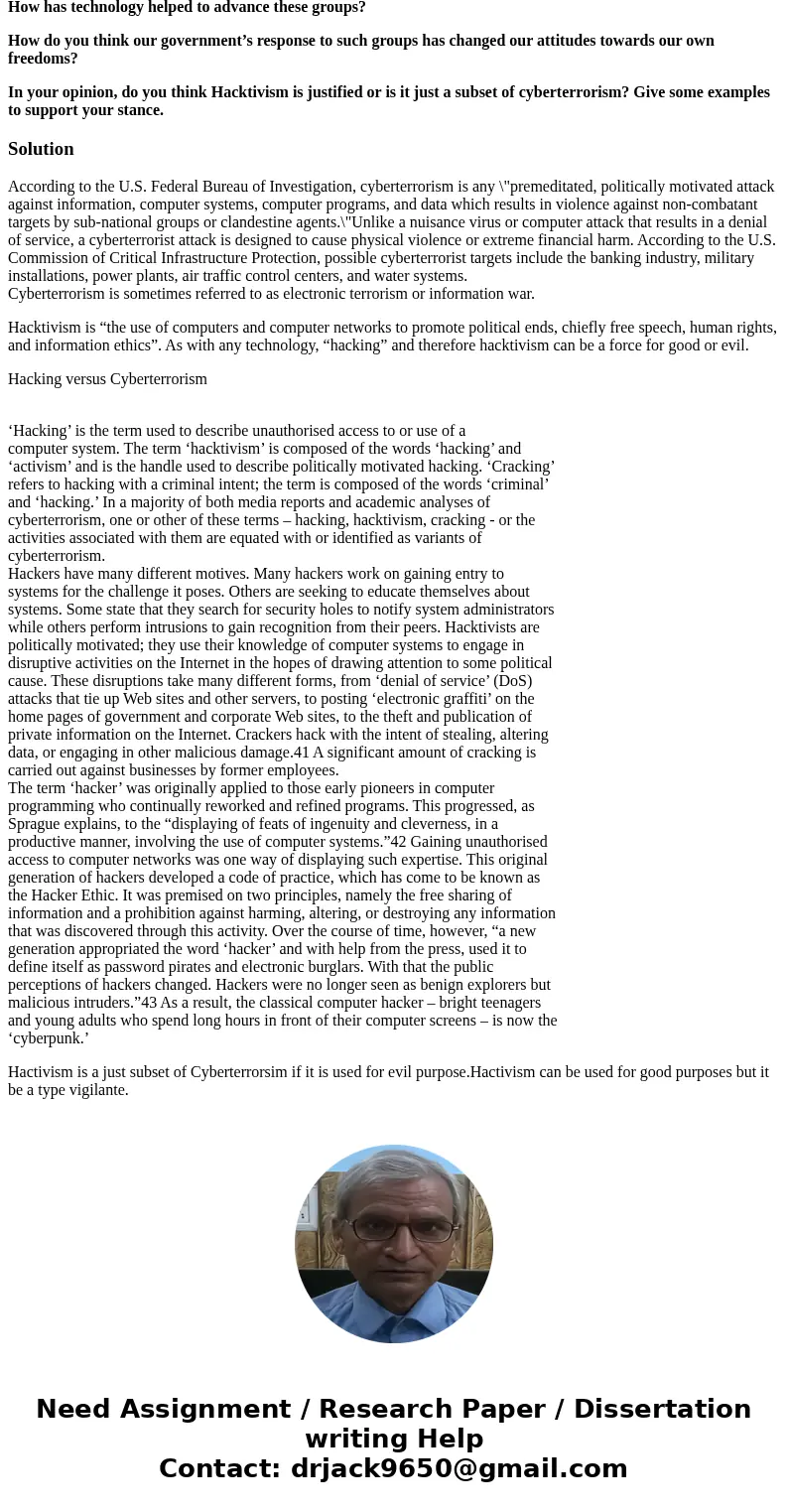Briefly define cyberterrorism Define hacktivism Illustrate e
Briefly define cyberterrorism. Define hacktivism. Illustrate examples of each in current events within the last decade.
What is the fundamental difference between these two?
How has technology helped to advance these groups?
How do you think our government’s response to such groups has changed our attitudes towards our own freedoms?
In your opinion, do you think Hacktivism is justified or is it just a subset of cyberterrorism? Give some examples to support your stance.
Solution
According to the U.S. Federal Bureau of Investigation, cyberterrorism is any \"premeditated, politically motivated attack against information, computer systems, computer programs, and data which results in violence against non-combatant targets by sub-national groups or clandestine agents.\"Unlike a nuisance virus or computer attack that results in a denial of service, a cyberterrorist attack is designed to cause physical violence or extreme financial harm. According to the U.S. Commission of Critical Infrastructure Protection, possible cyberterrorist targets include the banking industry, military installations, power plants, air traffic control centers, and water systems.
Cyberterrorism is sometimes referred to as electronic terrorism or information war.
Hacktivism is “the use of computers and computer networks to promote political ends, chiefly free speech, human rights, and information ethics”. As with any technology, “hacking” and therefore hacktivism can be a force for good or evil.
Hacking versus Cyberterrorism
‘Hacking’ is the term used to describe unauthorised access to or use of a
computer system. The term ‘hacktivism’ is composed of the words ‘hacking’ and
‘activism’ and is the handle used to describe politically motivated hacking. ‘Cracking’
refers to hacking with a criminal intent; the term is composed of the words ‘criminal’
and ‘hacking.’ In a majority of both media reports and academic analyses of
cyberterrorism, one or other of these terms – hacking, hacktivism, cracking - or the
activities associated with them are equated with or identified as variants of
cyberterrorism.
Hackers have many different motives. Many hackers work on gaining entry to
systems for the challenge it poses. Others are seeking to educate themselves about
systems. Some state that they search for security holes to notify system administrators
while others perform intrusions to gain recognition from their peers. Hacktivists are
politically motivated; they use their knowledge of computer systems to engage in
disruptive activities on the Internet in the hopes of drawing attention to some political
cause. These disruptions take many different forms, from ‘denial of service’ (DoS)
attacks that tie up Web sites and other servers, to posting ‘electronic graffiti’ on the
home pages of government and corporate Web sites, to the theft and publication of
private information on the Internet. Crackers hack with the intent of stealing, altering
data, or engaging in other malicious damage.41 A significant amount of cracking is
carried out against businesses by former employees.
The term ‘hacker’ was originally applied to those early pioneers in computer
programming who continually reworked and refined programs. This progressed, as
Sprague explains, to the “displaying of feats of ingenuity and cleverness, in a
productive manner, involving the use of computer systems.”42 Gaining unauthorised
access to computer networks was one way of displaying such expertise. This original
generation of hackers developed a code of practice, which has come to be known as
the Hacker Ethic. It was premised on two principles, namely the free sharing of
information and a prohibition against harming, altering, or destroying any information
that was discovered through this activity. Over the course of time, however, “a new
generation appropriated the word ‘hacker’ and with help from the press, used it to
define itself as password pirates and electronic burglars. With that the public
perceptions of hackers changed. Hackers were no longer seen as benign explorers but
malicious intruders.”43 As a result, the classical computer hacker – bright teenagers
and young adults who spend long hours in front of their computer screens – is now the
‘cyberpunk.’
Hactivism is a just subset of Cyberterrorsim if it is used for evil purpose.Hactivism can be used for good purposes but it be a type vigilante.


 Homework Sourse
Homework Sourse